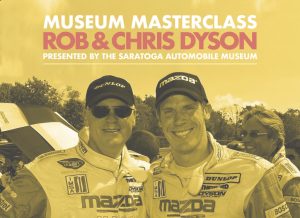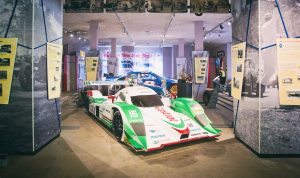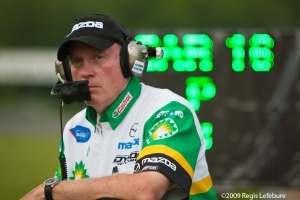Part three of our three-part Team Chat with James Weaver. The American Le Man Series media guide called him “one of the world’s great racing drivers, no matter which discipline.” James Weaver raced for thirty years before retiring in 2006. He had 100 career wins and over 200 podium finishes, the bulk of these triumphs accomplished during his twenty-year career with Dyson Racing. He was a fearsome competitor and one of the sport’s best set-up drivers. His graciousness, irrepressible humor and affable personality made him a favorite of the fans and racing’s best ambassador.
What are your children up to?
“The oldest one is at Cambridge University, reading English. My wife and I are so proud of her. Cambridge and Oxford are the top two universities in England. Our youngest one loves her horses and has done very well competitively with them. So every weekend we are off with the horse box running a pony instead of a racing car and having great fun.”
Are your children as competitive as you?
“The funny thing is they are both such sweet hearts, and yet both of them are very hard working and very competitive. The oldest is competitive academically, but not as much in sports, though she does come running with me, whereas the youngest is competitive in both academics and sports.”
What do you drive on the street?
“I have a little Lotus Elise. Which my wife bought for me. She has been in it twice. She is not overly fond of it, whereas I love it.”
What kind of driver are you on the street?
“I think I am pretty pedestrian, but she thinks I am homicidal maniac. I picked Rob up at the airport once and he asked what kind of car the Lotus was and I told him it was a modern vintage car. We were going up to Lola and he drove it and he went, ‘oh yeah, I see what you mean,’ and I think he quite enjoyed it.”
Are you doing anything with Dyson Racing right now?
“Yes, doing a bit on the engineering side – working with Peter Weston. Peter is massively clever; he is fantastic with all the calculations and the basic understanding of how things work. There is an incredible amount of information generated in racing today, so Rob has asked me to help the team wade through some of the data.”
Journalists have been kind to you over the years.
“I have always kept myself at arms length from that side of things for various reasons, not the least of which is it did not say James Weaver on the side of the truck! So I did not want to try to promote myself at anyone else’s expense. One of the classic mistakes is to underestimate your enemy. I always found it more helpful to be low key and then people don’t really notice you so much.”
So what is a typical day for you now?
“Sadly, in the morning, when I first get up, it is shoveling horse manure out of the stables which is not a good start to ones’ day! But once I get that out of the way, I live just like I did when I was racing, but I don’t go away for the weekend to the races. We have a nice old farmhouse in the country with a few acres and the horses so there is always plenty to do. For example, the pub may not be full so I have to go and see what I can do about that! Basically it is about having the time to do all the things you like to do – like tomorrow night, I am going to Oxford to meet Andy Wallace for a curry.”
You stay in touch with your teammates?
“Yeah, had a couple of e-mails from Butch today. Andy and I were trying to get him arrested by the CIA. We were bombarding him with spurious & highly suspect e-mails – but now that they have found Bin Laden we are going to have to find another plan.”
How would you rate Butch as a driver?
“It is quite extraordinary how much ability he has. He never really has to try, he is such a natural. He is so good that he does not have to sit in the car for two hours to get a handle on the car, it usually takes just four or five laps. When you have two drivers and you have to set the car up in a limited amount of time, he was absolutely fantastic because he could get on the pace instantly. So Butch would let me set the car up and he would jump in the car and get the most out of it. That made him a devastating teammate because not only could he deliver, but the way he performed allowed the whole team to perform at a higher level. When you have two drivers and if you are doing changes to suit each driver with no continuity, it really holds you back versus just having one person do the set up. Butch took it all in stride and always performed superbly.”
You have the reputation as being one of the best set up drivers in the business. How do you set up a car for multiple drivers?
“We would set up the car so that Rob would enjoy driving it. He would be driving his desk in Manhattan all week and then would have to get in a car that he could drive for the weekend. You can make a car go quick if you stiffen it up and make it all go-karty. But that is only good if you have been sitting in it all day. But your teammate is not going to like it if he has not been part of plotting all the changes. So we used to concentrate on running the car quite stiffly damped but relatively softly sprung. That gave the car more feel and it talked to you and was easier to drive. It was harder on the engineers to get it right, but also meant when you had four different drivers with different styles, they could all adapt to the car. So that was the Dyson philosophy really – make the car so everybody would be quick in it. We did that well, but it did take a bit of effort.
“What you have to remember is if you keep on making changes, all you do is change things. You have to think in terms of adding some speed to it. To that end, you are going to lower its center of gravity, crank some down load into it, and get the drag out of it down the straight. You have to look at it within the discipline of making changes that will do that, otherwise it is very easy to fall into the trap of throwing springs and dampers and god knows what else at it, and after two days of testing, you will not have gone any quicker. The car will be completely different, but you will still be going the same speed, because you always gain somewhere and loose somewhere else. That is the key to it: what is actually going to bring the speed to the party? To achieve this, you have to respect the aero map and tire requirements.”
How would you rate Andy as a driver?
“Andy won the British Formula Three championship which is incredibly difficult to do. Pretty much anyone who has ever won that – Piquet, Senna, etc, all go into Formula One. He was unlucky that he just did not get the F1 breaks. The first time he went to Le Mans with Jaguar, he won it. He is the only guy who has won Le Mans, Sebring, Daytona and Petit Le Mans – and Andy will joke that my long distance trophy cabinet is the smallest in the world, whereas his must be one of the biggest. As a driver, he is incredibly smooth – 100% safe pair of hands, very very fast, and technically, very very good on all the gizmos and electronics.”
How would you rate Rob as a driver?
“He was very good. But than he was very good at everything. I remember going flying with him and he was a great pilot. Anything he turned his hand to, he does really well. I think if he had concentrated on racing and not business, I never would have got the job! I remember one time racing at Sears Point and Rob jumped in one car and I jumped in the other and I could not keep up with him. As he was paying my wages, I was not that thrilled about it, but luckily, he did not seem to notice! Rob can process all the information – he was excellent that way. The mental side of it was a walk in the park for him.”
And Chris, how would you rate him?
“He is a natural athlete. He is extremely bright, naturally competitive and gifted. He gets his speed from massive amounts of competiveness. He has very good car feedback and understands how to interpret all the data that is involved in today’s racing. He is very dedicated to his craft. Rob is very mechanically minded, and Chris a little less so. It makes sense for Rob’s technical feedback to reflect his mechanical knowledge. Chris has an excellent feel for the car, and it amazes me that it is so insightful when the feedback is not rooted as much in the mechanical interest like the Guvnor. He has very good observation and detective skills.”
How would you rate yourself as a driver?
“I use to love the fast corners, but felt on the slow corners, that I always slowed the car down a fraction too much going in and concentrated too much on the throttle coming out. I think I am quite competitive and wanted to do really well, but I think I would get to the point where I got a bit squeamish with all the politics and went ‘OK, that is enough for me.’ I went racing for the love of it and the enjoyment of it and if you are hacking and fighting to get your own way too much, to me, that just takes the fun out of it. I realized my driving was very much effected by how much fun I was having. If I was enjoying it, I could give most people a run for the money. That was one of the great things about driving for Rob: there were no politics.”
Your best race?
“The one that sticks in my mind the most is Watkins Glen, which is such a stunning track. We had the Riley & Scott. I think it was a six or eight lap sprint to set the field for the next day. It was to be held before it got dark, but something happened and the schedule got backed up and by the time the race started, it was actually pitch black and you could not see a thing. There were no curb markings or anything. So we set off and you could not see your hand in front of your face. Luckily, the Riley & Scott had the headlights high up in the nose, whereas the Ferraris had them low in the nose, so at least we had half a chance to see things. We won the race. It was great fun, it was like racing back from the pub. We had not set the headlights up or anything and had never done a lap there in the dark. It was like going back to the Formula Ford days when you were not on top of it mentally and everything was getting fired at you at a million miles an hour, and you were just back to hacking and thrashing away like it was your first race. I loved it. It was outrageous fun – when you up through the esses flat out and in the pitch black, you felt like you where going 700 miles per hour!”
What makes for a good racetrack?
“It has to follow the natural contours of the land. It has to have elevation change and must not have a lot of corners. Too often, people who design a racetrack say, ‘hang on a minute, let’s whack some corners in here.’ That is the worst thing you can do. All the best racetracks actually do not have that many corners per mile. You need some for variety, but you do not want to over do it.”
Favorite track?
“I used to love the old Road Atlanta. You would come into the dip flat out at over 200mph in a 962 and then brake and down a gear to go under the bridge – that was pretty mega. The bridge framed the sky so it looked like a blue letterbox, through which you had to post the car. Mosport and Watkins Glen are a close second. Lime Rock is right up there with Sears Point probably fourth, maybe Elkhart after that. All my favorite tracks are in America and Canada. The old Brands Hatch Grand Prix circuit was fantastic. I use to love the old Silverstone and Spa is not bad – though it constantly rains there which is a bit dull.”
Best memory at Dyson Racing?
“My worst one was when I set fire to Rob’s house. Elliott (Forbes Robinson) and I – we probably had a couple beers to be fair – were staying there for the Lime Rock weekend. The farmhouse had just been renovated and it was wet and miserable outside and Rob and Em were coming home and Elliott and I thought, ‘hang on, lets get the fire going and get it nice and warm for them.” We are both a bit deaf and we heard this funny beeping noise. Both Elliott and I thought is must be some computer or something, and we kept on looking around wondering what it was – well it was the fire alarm and the local fire brigade arrived mob handed. Luckily the house did not actually catch fire. It turns out when they renovated, there was a smoke leak in the chimney which set off the fire alarm in the attic. Must say, that was a bit of a nervous moment, when we thought the chimney was on fire, for that would have been a disaster.
“I think my best memory was probably Atlanta ’87 – that was my first race for Rob and we won and I was driving with Price.”
Primary emotion when you look back?
“Just the amount of fun we had was absolutely outrageous. The thrill of being able to drive fast cars and racing. I thought I appreciated it when I was doing it, but now that I have stopped, I realize I did not fully. I just can not believe how lucky I was to have been able to go motor racing and have such a fantastic time and I think how on earth did I ever get that lucky?”


